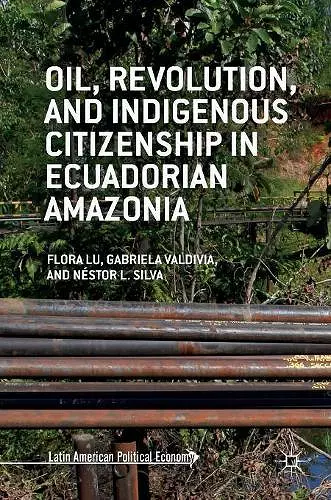Oil, Revolution, and Indigenous Citizenship in Ecuadorian Amazonia
Flora Lu author Gabriela Valdivia author Néstor L Silva author
Format:Hardback
Publisher:Palgrave Macmillan
Published:30th Nov '16
Currently unavailable, and unfortunately no date known when it will be back

"The book's treatment of oil extraction and Ecuador's Revolucion Ciudadana is both original and multifaceted: an ethnography of the relations among Waorani, the State, and oil firms, as they are enacted through notions of citizenship and the regime's 'habits of oil rule'. Without taking easy sides, the book admirably discusses the aporias of 'the Turn to the Left,' contributing to explain why some of these experiments are coming to an end." (Arturo Escobar, Kenan Distinguished Professor of Anthropology, University of North Carolina, Chapel Hill, USA)
This book addresses the political ecology of the Ecuadorian petro-state since the turn of the century and contextualizes state-civil society relations in contemporary Ecuador to produce an analysis of oil and Revolution in twenty-first century Latin America.
This book addresses the political ecology of the Ecuadorian petro-state since the turn of the century and contextualizes state-civil society relations in contemporary Ecuador to produce an analysis of oil and Revolution in twenty-first century Latin America. Ecuador’s recent history is marked by changes in state-citizen relations: the election of political firebrand, Rafael Correa; a new constitution recognizing the value of pluriculturality and nature’s rights; and new rules for distributing state oil revenues. One of the most emblematic projects at this time is the Correa administration’s Revolución Ciudadana, an oil-funded project of social investment and infrastructural development that claims to blaze a responsible and responsive path towards wellbeing for all Ecuadorians. The contributors to this book examine the key interventions of the recent political revolution—the investment of oil revenues into public works in Amazonia and across Ecuador; an initiative to keep oil underground; and the protection of the country’s most marginalized peoples—to illustrate how new forms of citizenship are required and forged. Through a focus on Amazonia and the Waorani, this book analyzes the burdens and opportunities created by oil-financed social and environmental change, and how these alter life in Amazonian extraction sites and across Ecuador.
“This is an outstanding contribution to the literature on neo-extractivism and indigenous peoples in Latin America. It raises difficult questions about what the post-neoliberal projects of the Ecuadorian petro-state have meant and will continue to mean for indigenous citizens who are insufficiently recognized, co-opted and reified for their symbolic capital, and engaged in ways that are inefficient, insensitive, and often counter-productive. It is essential reading for anyone concerned with the innumerable and often disguised costs of continuing oil extraction.” (Erin Fitz-Henry, Journal of Iberian and Latin American Research, Vol. 23 (2), 2017)
ISBN: 9781137564627
Dimensions: unknown
Weight: 5106g
296 pages
1st ed. 2017